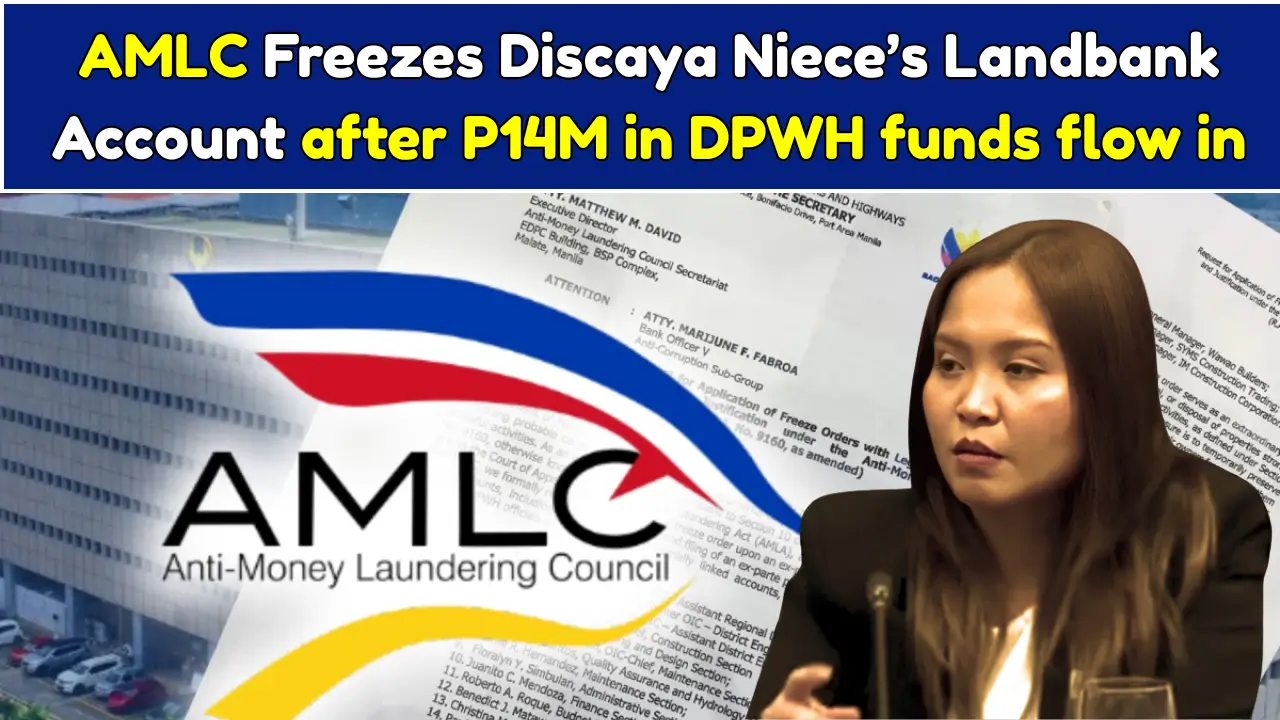The Anti-Money Laundering Council (AMLC) has frozen the sole Land Bank of the Philippines (Landbank) account of Roma Angelie Discaya Rimando, niece of the alleged flood-control king Curlee Discaya, following the discovery of millions of pesos in deposits linked to the Department of Public Works and Highways (DPWH).
The freeze order came amid suspicions arising from a pattern of rapid deposits and withdrawals totaling around ₱14 million, part of a larger flow of government funds tied to questionable flood-control projects.
Background and Overview
Roma Angelie Discaya Rimando’s Landbank account received significant government funds. AMLC documents reveal that from 2020 to 2024, Rimando’s account underwent a sequence of deposits amounting to ₱51.246 million transferred from DPWH funds.
Withdrawals, mostly done over the counter, totaled ₱113.876 million across just 12 transactions, showing a “deposit today, cash out tomorrow” behavior that alarmed investigators.
Such quick turnover of funds is atypical for construction firms, which usually retain government money longer to fund ongoing project expenses.
AMLC indicated that this irregularity suggested an attempt to obscure money trails, hinting at potential money laundering and corruption schemes within the DPWH flood-control contracts.
The Discaya Group and St. Timothy Construction
Rimando is known as the dummy owner and general manager of St. Timothy Construction, a key player in the Discaya group’s business empire.
St. Timothy is the second-largest company under the group, having been awarded 101 flood-control contracts in three years, worth about ₱7 billion.
The company was initially capitalized with just ₱3.93 million in 2014 but saw its financial transactions balloon to a staggering ₱48.3 billion since 2016.
This includes nearly 10,000 transactions, with one single government-funded transaction recorded at ₱571.55 million, among the largest on record.
In a Senate Blue Ribbon Committee hearing, Rimando claimed to have turned a loan from her uncle into “billions” of revenue, further raising eyebrows given the stark contrast between the company’s humble start and exponential financial growth.
AMLC Investigation and Freeze Orders
The AMLC’s freeze order is part of a sweeping crackdown on funds linked to DPWH flood-control corruption.
Along with Rimando’s account, AMLC has frozen 425 bank accounts, 73 vehicles (including luxury cars linked to the Discaya family), numerous insurance policies, and other assets worth hundreds of millions of pesos.
The suspicious transactions flagged by the AMLC involve large government disbursements rapidly cycled out of accounts, complicating efforts to trace the flow and use of funds.
The agency’s mandate under the Anti-Money Laundering Act allows it to freeze assets where probable cause exists to suspect links to unlawful activities such as money laundering stemming from graft in government contracts.
Land Bank’s Response
Land Bank of the Philippines has defended its handling of funds deposited by DPWH contractors, stressing that all transactions were properly documented and complied with banking laws, regulations, and government mandates.
The bank explained that these funds were legitimate, allocated under the General Appropriations Act and channeled through the Department of Budget and Management.
The bank also highlighted its strict adherence to “Know Your Client” (KYC) protocols and risk management processes in opening and managing contractor accounts.
Cash withdrawals exceeding ₱500,000 are reported to AMLC through Covered Transaction Reports, and any suspicious transactions prompt Suspicious Transaction Reports for further investigation.
Landbank stated that while it executes banking transactions faithfully, it does not conduct investigatory functions beyond its legal mandate and remains fully cooperative with authorities.
Table: Key Financial Data Related to Rimando’s Landbank Account and St. Timothy Construction
| Item | Amount (in Million PHP) | Description |
| Total DPWH Deposits to Rimando’s Account | ₱51.246 | Government funds received between 2020-2024 |
| Total Over-the-Counter Withdrawals | ₱113.876 | Withdrawals in 12 transactions, same period |
| Initial Capital of St. Timothy Construction | ₱3.93 | Capital at company registration in 2014 |
| Total Bank Inflows in St. Timothy Accounts | ₱48,300 | Since 2016, encompassing 9,975 transactions |
| Largest Single Transaction | ₱571.55 | Single deposit recorded in St. Timothy accounts |
| Number of DPWH Flood-Control Projects | 101 | Contracted projects executed over 3 years |
| Total Contract Value of Projects | ₱7,000 | Approximate value of flood-control contracts |
Implications and Broader Context
The freeze of Rimando’s account is part of a larger government effort to clean up corruption in DPWH flood-control projects. These projects, aimed at preventing urban and rural flooding, have come under scrutiny for alleged kickbacks, anomalous contracts, and misuse of public funds.
The Discaya family, known for amassing significant wealth during the Duterte administration, faces intense law enforcement actions, including freeze orders on luxury vehicles and additional bank accounts.
The AMLC’s crackdown sends a strong signal about the government’s commitment to dismantling corrupt practices and strengthening financial transparency related to public infrastructure spending.
Conclusion
The AMLC’s freezing of Roma Angelie Discaya Rimando’s Landbank account after tracking millions in suspicious DPWH funds underlines ongoing efforts to investigate and combat corruption in Philippine government projects.
While Landbank maintains its transactions’ legality, the unusual pattern of rapid fund movements raises reasonable suspicion.
This case highlights the broader challenge of ensuring accountability and integrity in the management of public funds, especially in infrastructure sectors critical to public safety and welfare.
Frequently Asked Questions (FAQs)
1. Who is Roma Angelie Discaya Rimando?
She is the niece of alleged flood-control king Curlee Discaya and the registered owner and general manager of St. Timothy Construction, a company with significant DPWH flood-control contracts.
2. What is the “deposit today, cash out tomorrow” pattern?
It refers to the rapid deposit and almost immediate withdrawal of funds from a bank account, which can obscure the money trail and may indicate money laundering or irregularities.
3. Why did the AMLC freeze the Landbank account?
The AMLC froze the account due to suspicious transactions involving government funds linked to DPWH flood-control projects that suggested possible money laundering or irregular use of the funds.
4. How does Landbank respond to these allegations?
Landbank states all transactions followed banking laws and government regulations, emphasizing its role is to facilitate legitimate government transactions and that it cooperates fully with authorities.
5. What broader action is AMLC taking against suspected DPWH corruption?
AMLC has frozen hundreds of bank accounts, dozens of luxury vehicles, insurance policies, and other assets connected to individuals and companies linked to DPWH flood-control corruption schemes.






